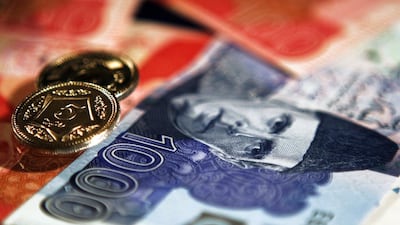Pakistan hopes to attract as much as $30 billion of investment from Saudi Arabia and the UAE in February to help boost its fragile economy and create job opportunities.
"We are going to sign investment agreements of up to $20bn with Saudi Arabia and $10bn with the UAE in the next couple of weeks," Haroon Sharif, the chairman of Pakistan's Board of Investment, told The National. "All the required paper work for the deals has been completed with mutual consent of relevant officials of the kingdom and the UAE."
Countries from the Arabian Gulf will be investing in the fields of renewable energy, mining, petrochemicals, real estate and agriculture, besides setting up two separate oil refineries – one each by the Saudi Arabia and the UAE – worth $10bn and $6bn, respectively. The cash-strapped Islamic nation expects to sign the agreements during Saudi Crown Prince Mohammed Bin Salman's visit to Islamabad next month. The UAE's investment will also materialise next month, Pakistani officials said.
When he took office in August of last year, Prime Minister Imran Khan was faced with an immediate balance of payments crisis and Pakistan's currency had registered a sharp devaluation, losing about a fifth of its value against the US dollar since the end of 2017. The country's foreign reserves have dropped to about $7bn, enough to cover one and a half month of imports.
"The investment from the Gulf countries will surely act as a big shot in the arm for our fragile economy," said Ashfaque Khan, senior economist and Dean at School of Social Sciences and Humanities, National University of Sciences and Technology in Islamabad. The financing will also help "improve [the] image" of the country and lure investment from other nations as well."
Parallel to receiving aid from Gulf countries, Islamabad continues to engage the International Monetary Fund for a potential bailout package that would help it address its balance of payments issue.
The Washington-based lender, which has a long history with Islamabad and has bailed it out 12 times, urged the government to cut spending, bolster its tax regime to shore up revenues that will help stabilise the economy and keep the budget deficit at about 5 per cent of the gross domestic product.
Last month, the IMF lowered its 2019 economic growth forecast for the Middle East, North Africa, Afghanistan and Pakistan by 0.3 percentage points to 2.4 per cent. Prior to the revised projections, the IMF had projected Pakistan’s growth would slow to 4 per cent in 2019 and about 3 per cent in the medium term.
The government needs to take measures to "to correct the macroeconomic framework by introducing cogent reforms in the financial system," said Waqar Khan, a senior economist and former finance secretary.
Recent financial assistance of $9bn ($6bn from Saudi Arabia and $3bn from the UAE) has helped improve the country's economic outlook. The investment from both countries will help create jobs in the South Asian nation of 208 million people.
A joint committee meeting – led by Pakistan’s Foreign Minister Shah Mahmood Qureshi and his UAE counterpart – will be held in Abu Dhabi on February 14 and 15 to firm up the investment plans and follow up on the one-day visit of Sheikh Mohammed bin Zayed, the Crown Prince of Abu Dhabi and Deputy Supreme Commander of the UAE Armed Forces, to Islamabad on January 6.
Amid struggles to lure foreign investment, Prime Minister Khan is also leading an anti-corruption campaign to stop capital flight from the country through money-laundering. His government’s efforts to increase tax revenue and bring back the looted wealth stashed abroad have yielded little results so far.

